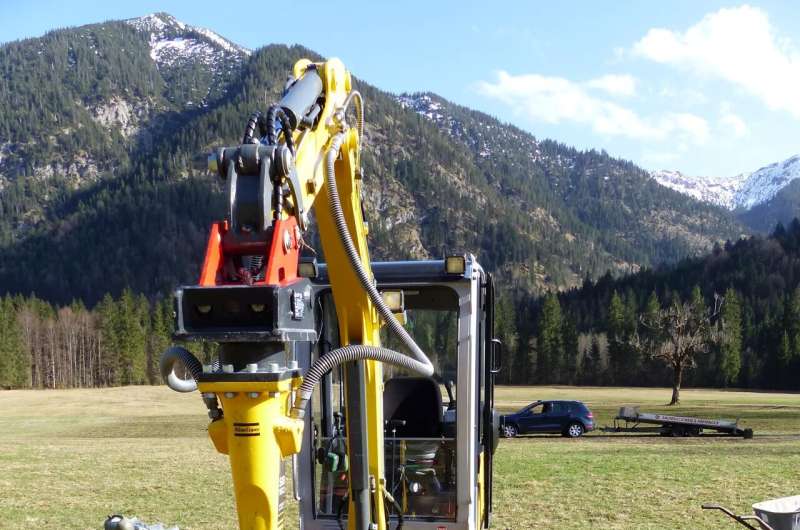This article has been reviewed according to Science X's editorial process and policies. Editors have highlighted the following attributes while ensuring the content's credibility:
fact-checked
trusted source
proofread
Climate change threatens mountain meadows by reducing humus content, finds study

Mountain meadows are unique ecosystems. A research team led by the Technical University of Munich (TUM) has now discovered that climate change reduces the humus content as well as the nitrogen stores in the grassland soils of the Alps and disturbs the soil structure. Organic fertilization, for example with liquid manure, can compensate this loss of soil organic matter to some extent.
The research is published in the journal Geoderma.
To recreate the effects of climate change under realistic conditions, the researchers used soil–plant mesocosms. These miniature ecosystems consist of units containing soil samples. By moving the mesocosms along an elevation gradient from higher, cooler locations to lower, warmer locations, the scientists simulated climate change. Thereby, they simulated a warming of up to 3°C, depending on the difference in altitude between the original and the new locations.
"Studying soil responses to climate change in detail helps us to better understand the long-term effects on alpine grassland ecosystems," says soil researcher Dr. Noelia Garcia-Franco. The study was carried out on various areas in the Bavarian districts of Weilheim-Schongau and Garmisch-Partenkirchen.
Half of the mesocosms were cultivated intensively and the other half extensively, i.e., they were mowed at different frequencies and fertilized with liquid manure, for example. Soil samples were taken after four years.
Humus content, soil structure and nutrient stores decline dramatically
As a result of 2° and 3° temperature increases, the humus content declined rapidly and sharply, with the decline being even more pronounced under extensive management. With extensive management, the soil lost 22% of humus at a temperature increase of 3° and 14% at 2°. Under intensive management, soil humus loss amounted to 11% under these conditions. The more intensive organic fertilization was able to partially compensate for the loss of organic matter.
Overall, increased temperature significantly impairs the soil structure. The clods of earth that make up the soil are destabilized and, as a result, soil organic matter is degraded increasingly. "The size of the soil clods could be an early warning signal for the impending loss of humus and soil structure," says Garcia-Franco. The researchers also observed that the soil stock of the important plant nutrient nitrogen declined.
Important carbon reservoirs under threat
Climate change is progressing faster in central and northern European mountain regions in particular than in other areas. For example, the average annual temperature in the European Alps has risen by 2° since the 1980s. The special combination of high precipitation and low average temperature means that the soils there store a particularly large amount of carbon as humus.
Grassland in the Alps and Alpine foothills is one of the largest reservoirs of soil-bound organic carbon in Central Europe. However, higher temperatures increase the activity of microorganisms in the soil, especially in the winter months. As a result, humus is broken down more quickly and released as CO2.
Mountain meadows fulfill important economic and ecological functions: They produce large quantities of high-quality animal feed and play an essential role in storing water and nutrients as well as maintaining a high diversity of plants and soil organisms. Climate change could impair these functions in the long term.
More information: Noelia Garcia-Franco et al, Rapid loss of organic carbon and soil structure in mountainous grassland topsoils induced by simulated climate change, Geoderma (2024). DOI: 10.1016/j.geoderma.2024.116807
Provided by Technical University Munich




















